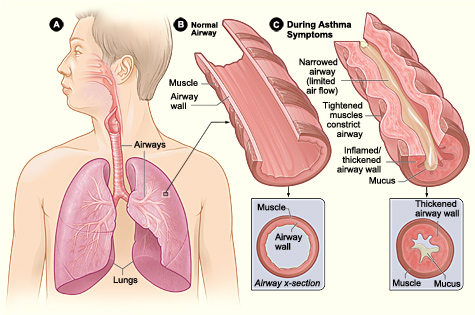

Asthma is a common long-term condition that can cause a cough, wheezing, and breathlessness. The severity of the symptoms varies from person to person. Asthma can be controlled well in most people most of the time.
What is asthma?
Asthma is caused by inflammation of the airways. These are the small tubes, called bronchi, which carry air in and out of the lungs. If you have asthma, the bronchi will be inflamed and more sensitive than normal.
When you come into contact with something that irritates your lungs, known as a trigger (see below), your airways become narrow, the muscles around them tighten and there is an increase in the production of sticky mucus (phlegm). This leads to symptoms including:
-
difficulty breathing
-
wheezing and coughing
-
a tight chest
A severe onset of symptoms is known as an asthma attack or an 'acute asthma exacerbation'. Asthma attacks may require hospital treatment and can sometimes be life-threatening, although this is rare.
For some people with chronic (long-lasting) asthma, long-term inflammation of the airways may lead to more permanent narrowing.
If you are diagnosed with asthma as a child, the symptoms may disappear during your teenage years. However, asthma can return in adulthood. Moderate to severe childhood symptoms are more likely to persist or return later in life. Although asthma does not only start in young people and can develop at any age.
What causes asthma?
The cause of asthma is not fully understood, although it is known to run in families. You are more likely to have asthma if one or both of your parents has the condition.
While there is no cure for asthma, there are a number of treatments that can help effectively control the condition. Treatment is based on two important goals:
-
relieving symptoms
-
preventing future symptoms and attacks from developing
Treatment and prevention involves a combination of medicines, lifestyle advice, and identifying and then avoiding potential asthma triggers.
The symptoms of asthma can range from mild to severe. When asthma symptoms get significantly worse, it is known as an asthma attack.
The symptoms of asthma include:
-
feeling breathless (you may gasp for breath)
-
a tight chest, like a band tightening around it
-
wheezing, which makes a whistling sound when you breathe
-
coughing, particularly at night and early morning
-
attacks triggered by exercise, exposure to allergens and other triggers
You may experience one or more of these symptoms. Symptoms that are worse during the night or with exercise can mean your asthma is getting worse or is poorly controlled. Talk to your doctor or asthma nurse about this.
Asthma attack
A severe asthma attack usually develops slowly, taking 6 to 48 hours to become serious. However, for some people, asthma symptoms can get worse quickly.
As well as symptoms getting worse, signs of an asthma attack include:
-
you get more wheezy, tight-chested or breathless
-
the reliever inhaler is not helping as much as usual
-
there is a drop in your peak expiratory flow (see diagnosing asthma for more information)
If you notice these signs, do not ignore them. Contact your GP or asthma clinic or consult your asthma action plan, if you have one.
Signs of a severe asthma attack include:
-
the reliever inhaler, which is usually blue, does not help symptoms at all
-
the symptoms of wheezing, coughing and tight chest are severe and constant
-
you are too breathless to speak
-
your pulse is racing
-
you feel agitated or restless
-
your lips or fingernails look blue
Causes of asthma
There is no single cause of asthma, but certain things may increase the likelihood of developing it. These include genetics and the environment.
Who is at risk of developing asthma?
Things known to increase the likelihood of developing asthma include:
-
a family history of asthma or other related allergic conditions (known as atopic conditions), such as eczema, food allergy or hay fever
-
developing another atopic condition, such as a food allergy
-
having bronchiolitis as a child (a common lung infection among children)
-
being exposed to tobacco smoke as a child, particularly if your mother smoked during pregnancy
-
being born prematurely (especially if you needed a ventilator)
-
a low birth weight (less than 2kg or 4.5lb)
What happens during an asthma attack?
During an asthma attack:
-
the bands of muscles around the airways tighten
-
there is increased inflammation in the linings of the airways, which swell
-
the airways produce sticky mucus or phlegm, which can cause them to narrow further